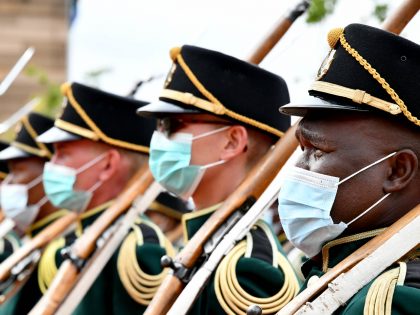
Instrumentalizing migrants
From Operation Fiela to Operation Dudula, xenophobia in South Africa is bent on protecting the interests of politicians.
377 Search Results for: Angola

From Operation Fiela to Operation Dudula, xenophobia in South Africa is bent on protecting the interests of politicians.

In the first of five articles on Afrobeat in South America, Simon Adetona Akindes discusses Abayomy Afrobeat Orquestra and Bixiga 70 from Brazil.

On this month's Africa Is a Country Radio, we soundtrack traditional martial arts and combat sports across the African continent.

NoViolet Bulawayo’s novel 'Glory' forcefully evokes the Zimbabwean political landscape but struggles to stretch itself beyond the documentarian, vacillating between the journalistic and fictive.

The imperative to tell the untold stories of Zimbabwean freedom fighters during that country’s liberation war, especially their engagement with spirituality.

Amilcar Cabral’s influence stretched far beyond the Portuguese colonies, profoundly influencing the political struggle in South Africa, past and present.

Revisiting the papers of left, anti-colonial revolt from the continent can remind us of messy, rich alternatives.

In its first few years, the magazine 'Révolution Africaine' opened possibilities for Franco-Algerian cooperation. It was then co-opted by the state.

The film 'Neptune Frost' reduces the gulf between Africanfuturism and Afrofuturism by connecting their shared vision against violent systems of domination.

Chris Hani’s legacy is often reduced to debates about his assassination in April 1993, but his significance goes beyond South Africa’s democratic transition.

Contemporary approaches to the legacy of colonialism tend to narrowly emphasize political agency as the solution to Africa’s problems. But agency is configured through historically particular relations of which we are not sole authors.

Many know Frene Ginwala, the iconic anti-apartheid activist, as democratic South Africa’s first speaker of parliament. But few know of her time building pan-African media in Dar Es Salaam.

Pedro Monaville selects key texts that helped shape a new book on Congolese student-driven left nationalism in the aftermath of Patrice Lumumba’s assassination.

In Colombia, doing straightforward political music carries many risks, including confronting state repression, political armed rebellions, and organized crime.

In the context of climate apartheid, a new scramble for resources, and debt crises, the Global South must find another way to be human.

How 'Dawn' magazine illustrates the significant role women played in South Africa’s armed struggle against apartheid.